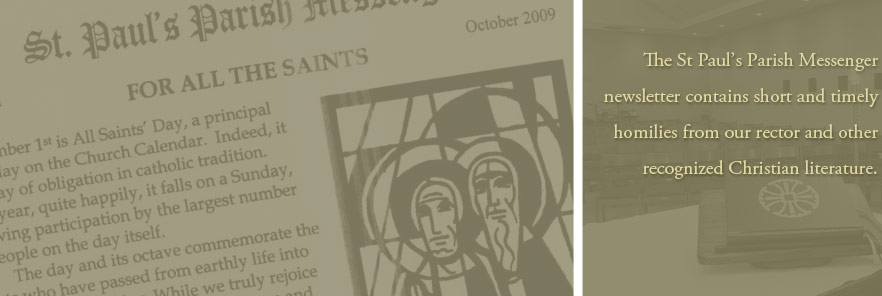Sunday, May 23rd is the Feast of Pentecost, a singularly significant event on the Church calendar. Originally it was part of a fifty-day celebration of the establishment of the Church, embracing the resurrection and ascension of our Lord and culminating in the coming of the Holy Spirit upon it on the Day of Pentecost; indeed the word itself means fiftieth day after Easter. Only in the fifth century were these three elements separated into distinct observances and holy days.
As for Pentecost, it can be confidently believed (with Luke, in his Gospel, 24.49 and in Acts 2.1-42) that the Holy Spirit indeed came upon Christ’s followers at the first Christian Pentecost according to his promise and formed his Church as he would have it. In the power of that Spirit his close followers declared the “mighty works of God” and Peter preached the first Christian sermon with such force and authority that “about three thousand souls” were added to the body of believers that single day, hence the birthday of the Church. In the strength of the same Spirit the apostles performed “many signs and wonders among the people”, as Stephen, who was said to have done so for Christ with “the face of an angel.”
It was the Spirit in the form of a light from heaven that converted Paul from being the chief persecutor of Christians to its chief preacher, transferring to him in turn the power to convert others throughout the eastern Mediterranean, especially Gentiles, so manifesting Christ for the world. The power received at Pentecost and thereafter was clearly a power to prevail, to succeed in the Lord’s Name.
On the other hand, success was by no means assured. From the beginning the apostles faced opposition, suffering, and death for the Lord, Paul indicating that he had had to endure more labors, imprisonments, and beatings unto death in his ministry than others (II Corinthians 11.23). At one point, he said, metaphorically, “I have been crucified with Christ” (Galatians 2.20) – only to have such prophetically come to pass when imprisoned and apparently chained to a guard (Acts 28.20) he preached the Lord Christ in Caesar’s household in Rome until presumably his martyrdom for the same around A.D. 65. Even in this, however, Paul had already grasped the paradox, the mystery of the spiritual power promised by Christ and delivered at Pentecost, for as the Lord tells Paul in a vision, his “power is made perfect in weakness” (II Corinthians 12.9).
Early on, in his first missionary journey, and after having been stoned and dragged about, Paul said, “through many tribulations we must enter the kingdom of God” (Acts 14.22).
He grasped fully the power both to prevail and to persevere in the Lord’s Name. We need to be ever mindful of this truth of truths with regard to the power of the Spirit given to the Church on Pentecost. Especially so today!
While, as Paul well shows, opposition to the Christian faith has been present from spiritual and secular realms from the beginning, it is particularly vexing now.
Revisionist forces within the Church seek to deny or dumb down timeless basic doctrine. The secular media delights in publicizing and mocking the Church for its faults, for its sins, even as it promotes every manner of sin. Secular and patently anti-spiritual enterprises seek to drive Bible reading and prayer from schools, sports teams, and government offices, all the while conducting business without moral or ethical principles.
If all this were not bad enough, just the past week a Christian street preacher in England was arrested and locked up on a charge of hate speech for quoting the Bible and saying that homosexuality is a sin in the eyes of God. Next, we can be sure, priests will be charged with discrimination for being unwilling to marry same sex couples in obedience to Scripture.
These are what they are! More tribulations through which Christians must pass to enter the kingdom of God!
– JR Hiles

